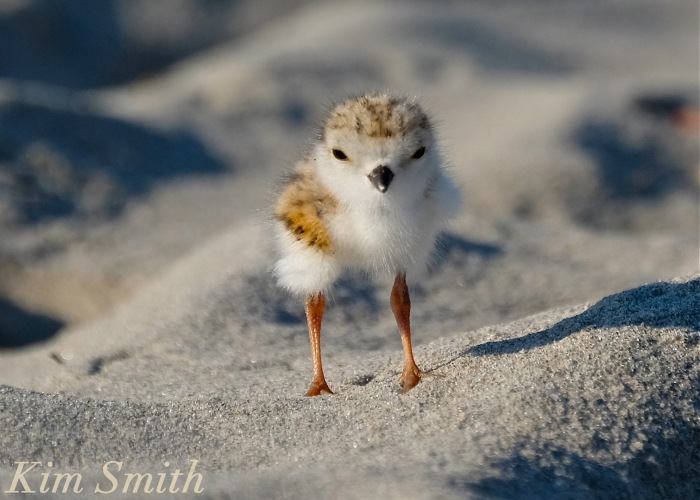 PIPING PLOVER UPDATE FROM THE MAYOR’S OFFICE
PIPING PLOVER UPDATE FROM THE MAYOR’S OFFICE
PIPING PLOVERS NESTING AT GOOD HARBOR BEACH
The City of Gloucester and Mayor Sefatia Romeo Theken will be working closely during the 2017 beach season at Good Harbor Beach with the Essex County Greenbelt Association and the MA Division of Fisheries and Wildlife to manage Piping Plovers if they return again to nest on the beach.
“For generations, Gloucester’s citizens have existed in a delicate balance with our coastal ecosystem, from the open ocean, to the rocky shorelines and of course to our beaches,” Mayor Romeo Theken said. “We are committed to making every effort possible to protect nesting Piping Plovers at our beaches but we will do so while maintaining public access to these amazing areas. Please help me and the City by cooperating with any short-term restrictions imposed at our beaches in 2017.”
In 2016, Piping Plovers, a small shorebird, were observed nesting for the first time at GHB, and the City acted quickly and responsibly along with Greenbelt and MADFW to protect the birds and their nesting areas. The City is preparing more proactively now for the 2017 beach season.
BACKGROUND:
Piping Plovers are a small shorebird that was placed on the US Endangered Species List in 1986 as a threatened species. Piping Plovers nest directly on the sand at beaches throughout MA, typically on the upper beach just below the outer dune edge. Statewide the Piping Plover population has been increasing over the past 20 years and the population reached about 650 pairs in MA in 2016.
In Gloucester in 2016, 4 pairs of Piping Plovers nested at Coffins Beach and fledged 10 young. A single pair of Piping Plovers nested at GHB, hatching 3 chicks but none survived to fledge. The Piping Plovers at GHB nested later than normal in the season which may have contributed to the lack of chick survival. Better early season protections could help eliminate this problem in 2017.
Good Harbor Beach Piping Plover making a nest scrape for his lady love to inspect
The US Endangered Species Act requires public and private landowners to take necessary measures to protect listed species like Piping Plovers. MA also has guidelines and laws for beach nesting bird management. The city is making every effort to be compliant with all regulatory guidelines.
Piping Plovers typically arrive from their southern wintering areas to our local beaches in late March or early April. Males and females quickly form breeding pairs that begin the process of courtship and nest site select throughout April and May. During April and May, it is important to limit disturbance to the birds and their habitats. Chicks can hatch from nests in late May and are immediately mobile and move out of the nest in search of food. As chicks grow older and larger, they will roam from the dunes to the water’s edge in search of food. Chicks are very vulnerable to human disturbance and are susceptible to predators like gulls and foxes.
One day old Piping Plover chick
PLAN OF ACTION FOR 2017:
Gloucester officials have directed City staff to collaborate with Greenbelt and MADFW to development management strategies to protect Piping Plovers found nesting on any Gloucester beaches.
Beach Scraping – Limiting beach cleaning activities like beach scraping with a tractor and mechanical rake is very important once Piping Plovers arrive at GHB. This could start in April and last though June in certain areas at GHB.
Fencing – It is also important to strategically select areas for temporary closure with single strand fencing and signs. These fenced areas allow a refuge for Piping Plovers to begin their nesting season normally in May, before the busy beach season. fences could be installed in April and be in place through June in certain areas at GHB.
Monitoring – Regular monitors from Greenbelt, MADFW and theCity will visit GHB in March/April to determine if PipingPlovers are present and to ensure that any nesting Piping Plovers are well protected. Monitoring will continue as long as Piping Plovers are present at the site.
Public Access – GHB will remain open to the public during the beach season. Only selected small areas may be closed to the public to protect Piping Plovers. Mayor Theken encourages all beachgoers to respect the closed areas and to consider Piping Plovers as an important part of Gloucester’s rich and healthy coastal ecosystem.
Dogs – Unleashed dogs can pose a very real threat to Piping Plover adults and chicks. Dogs owners are responsible for controlling their dogs and may be legally responsible for any adverse impacts to Piping Plovers and their habitats.
For more information, please contact Greenbelt Essex County Trust at dwr@ecga.org or (978) 768-7241 x14

Great photos and coverage, Kim. I HOPE the dummy ‘MY dog doesn’t follow any rules’ dopes have MANY eyes on them this Spring!”
LikeLike
That’s what I was going to say!
LikeLike
This is very good news!! Thank you for making as many people as possible aware of the situation last year, and good luck in your recent nomination, I think you really deserve to win!!
LikeLiked by 1 person
Thank you Cheryl, I very much appreciate your kind comments. Working on a short film about the plovers and hopefully that will help to show folks just how vulnerable are these little shorebirds, and how fortunate we are to have them nesting in our community.
LikeLike
Making a difference in your community is what it’s all about and all the visibility efforts pay very high dividends teaming! Excellent walking tall and proud indeed making a difference! 🙂 Dave & Kim 🙂
LikeLiked by 1 person
Proud to be a part of Joey’s GMG, we have a wonderful platform here to get the information out there 🙂
LikeLike
Reblogged this on Wolf's Birding and Bonsai Blog.
LikeLike